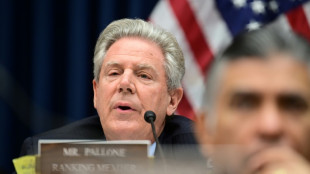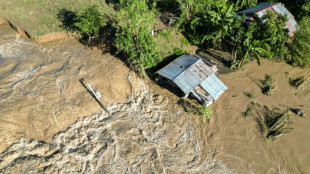
-
 US lawmaker accuses Azerbaijan in near 'assault' at COP29
US lawmaker accuses Azerbaijan in near 'assault' at COP29
-
Tuchel's England have 'tools' to win World Cup, says Carsley

-
 Federer hails 'historic' Nadal ahead of imminent retirement
Federer hails 'historic' Nadal ahead of imminent retirement
-
Ukraine vows no surrender, Kremlin issues nuke threat on 1,000th day of war

-
 Novo Nordisk's obesity drug Wegovy goes on sale in China
Novo Nordisk's obesity drug Wegovy goes on sale in China
-
Spain royals to visit flood epicentre after chaotic trip: media

-
 French farmers step up protests against EU-Mercosur deal
French farmers step up protests against EU-Mercosur deal
-
Rose says Europe Ryder Cup stars play 'for the badge' not money

-
 Negotiators seek to break COP29 impasse after G20 'marching orders'
Negotiators seek to break COP29 impasse after G20 'marching orders'
-
Burst dike leaves Filipino farmers under water

-
 Markets rally after US bounce as Nvidia comes into focus
Markets rally after US bounce as Nvidia comes into focus
-
Crisis-hit Thyssenkrupp books another hefty annual loss

-
 US envoy in Lebanon for talks on halting Israel-Hezbollah war
US envoy in Lebanon for talks on halting Israel-Hezbollah war
-
India to send 5,000 extra troops to quell Manipur unrest

-
 Sex, drugs and gritty reality on Prague's underworld tours
Sex, drugs and gritty reality on Prague's underworld tours
-
Farmers descend on London to overturn inheritance tax change

-
 Clippers upset Warriors, Lillard saves Bucks
Clippers upset Warriors, Lillard saves Bucks
-
Acquitted 'Hong Kong 47' defendant sees freedom as responsibility

-
 Floods strike thousands of houses in northern Philippines
Floods strike thousands of houses in northern Philippines
-
Illegal farm fires fuel Indian capital's smog misery

-
 SpaceX set for Starship's next flight, Trump expected to attend
SpaceX set for Starship's next flight, Trump expected to attend
-
Texans cruise as Cowboys crisis deepens

-
 Do the Donald! Trump dance takes US sport by storm
Do the Donald! Trump dance takes US sport by storm
-
Home hero Cameron Smith desperate for first win of 2024 at Australian PGA

-
 Team Trump assails Biden decision on missiles for Ukraine
Team Trump assails Biden decision on missiles for Ukraine
-
Hong Kong court jails 45 democracy campaigners on subversion charges

-
 Several children injured in car crash at central China school
Several children injured in car crash at central China school
-
Urban mosquito sparks malaria surge in East Africa

-
 Djibouti experiments with GM mosquito against malaria
Djibouti experiments with GM mosquito against malaria
-
Pulisic at the double as USA cruise past Jamaica

-
 Many children injured after car crashes at central China school: state media
Many children injured after car crashes at central China school: state media
-
Asian markets rally after US bounce as Nvidia comes into focus

-
 Tens of thousands march in New Zealand Maori rights protest
Tens of thousands march in New Zealand Maori rights protest
-
Five takeaways from the G20 summit in Rio

-
 China, Russia ministers discuss Korea tensions at G20: state media
China, Russia ministers discuss Korea tensions at G20: state media
-
Kohli form, opening woes dog India ahead of Australia Test series

-
 Parts of Great Barrier Reef suffer highest coral mortality on record
Parts of Great Barrier Reef suffer highest coral mortality on record
-
Defiant Lebanese harvest olives in the shadow of war

-
 Russian delegations visit Pyongyang as Ukraine war deepens ties
Russian delegations visit Pyongyang as Ukraine war deepens ties
-
S.Africa offers a lesson on how not to shut down a coal plant

-
 Italy beat Swiatek's Poland to reach BJK Cup final
Italy beat Swiatek's Poland to reach BJK Cup final
-
Japan, UK to hold regular economic security talks

-
 Divided G20 fails to agree on climate, Ukraine
Divided G20 fails to agree on climate, Ukraine
-
Can the Trump-Musk 'bromance' last?

-
 US to call for Google to sell Chrome browser: report
US to call for Google to sell Chrome browser: report
-
Macron hails 'good' US decision on Ukraine missiles

-
 Italy eliminate Swiatek's Poland to reach BJK Cup final
Italy eliminate Swiatek's Poland to reach BJK Cup final
-
Trump expected to attend next Starship rocket launch: reports

-
 Israeli strike on Beirut kills 5 as deadly rocket fire hits Israel
Israeli strike on Beirut kills 5 as deadly rocket fire hits Israel
-
Gvardiol steals in to ensure Croatia reach Nations League quarter-finals


Political will, pandemic weigh on talks to save nature
Nations aiming to agree a global plan to save nature ended their first in-person meeting in two years Tuesday saying negotiations needed more time, as observers called for greater political momentum in the race to halt biodiversity loss.
Two weeks of talks in Geneva produced a draft biodiversity framework for living "in harmony with nature" by mid-century -- with key milestones in 2030 -- that will be adopted at the United Nations COP15 conference in China later this year.
But the delegates representing nearly 200 nations -- although not the United States -- agreed to hold new negotiations in Nairobi in June, acknowledging that additions made to the draft by governments would need further negotiation.
The world is facing catastrophic declines in animals and plants that pose a twin threat to life on Earth with the interrelated menace of climate change.
Stemming the extinctions is a daunting task, not least because biodiversity is undermined by a host of human activities, from intensive agriculture and overfishing, to mining and rapid urbanisation.
"Biodiversity is not restricted to one place, it is everywhere, it is life," said Ghanaian academic Alfred Oteng-Yeboah, who has played a key role in international efforts to protect wildlife and species diversity.
The imperative to set ambitions that will be acted upon is even more urgent because the world missed almost all the targets that were set for the last decade.
"We think that this is the last chance that we have and if we miss it we don't know what is going to happen," said Oteng-Yeboah.
- 'Future generations' -
After two years of pandemic delay, the negotiations sought to pack in both technical scientific work as well as high-level negotiations on the overarching targets.
As talks in Geneva drew to a close on Tuesday evening delegations called for the process to step up a gear.
Speaking at the closing plenary, the New Zealand representative said the next meeting should move from countries stating positions into "negotiating mode".
While more than 90 nations have signed up to a pledge to halt biodiversity loss by 2030, delegates said the weight of that political will has not yet been felt at the negotiations.
"Despite leaders repeatedly signaling that they are committed to taking action on nature, we saw only limited progress in Geneva," said Marco Lambertini, Director General of WWF International, calling for "greater leadership" going into the next round of talks.
The most emblematic aim in the draft text is the protection of 30 percent of land and oceans by 2030 globally.
It is supported by a growing number of countries, but delegates cautioned that even that cornerstone target was not yet certain to be part of the agreement in Kunming, with several delegates saying that even COP 15 host China was reluctant to support the target.
And experts say that while headline goals are important, the failure to achieve previous ambitions points to deeper challenges.
A major one is money.
A group of nations issued a call at the end of the Geneva meeting for a sharp expansion in funding from developed nations of an extra $100 billion annually, rising to $700 billion a year, saying the failure to meet previous targets was partly because of a lack of funds.
"We have a responsibility to ourselves, our peoples, and our biodiversity, and to present and future generations to live in harmony with nature," said a statement from the group led by Gabon.
- Call to act -
Developed countries accept that more financing should go into protecting and restoring natural habitats, but they say this should come from national budgets, international aid, private financing.
The draft text also includes an aim to redirect, reform or end some $500 billion annually in subsidies that encourage activities harmful to nature.
But several delegates said the negotiations had not yet wrestled with the most difficult issues.
"We have not talked a lot about the transformation of production, agriculture, urban planning," said one.
A new meeting in the Kenyan capital will now be held between June 21 and 26 to finalise the draft text before COP15 in China, which sources say is expected in late August.
Neville Ash, who heads the UN Environment World Conservation Monitoring Centre, said he was confident that COP15 would result in an ambitious new set of goals and targets.
"We have no shortage of commitments. The success of the COP is not measured in terms of the outcome from the meeting itself, it's over the next decade and beyond in what actions are taken to deliver on those commitments," he told AFP.
H.Gonzales--AT
